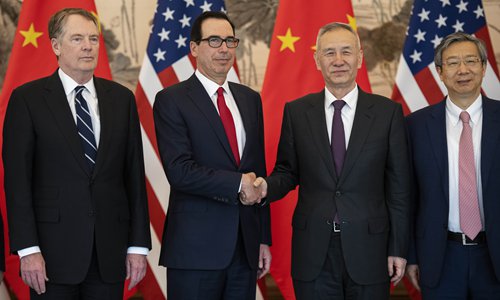
China's Vice Premier Liu He (2nd from right) shakes hands with US Treasury Secretary Steven Mnuchin (2nd from left) while posing for a group photo at the Diaoyutai State Guesthouse in Beijing on March 29. The top negotiators from the US were in Beijing for trade talks with Chinese sides. (Photo: AFP)
Chinese and US officials have maintained close contact in recent days on the remaining issues, and further negotiations could be underway, as the two countries inch toward a final trade agreement to end their tariff war, China's commerce ministry said on Thursday.
However, even as officials hailed new progress in recent talks and appear committed to a final deal, a new point of tension emerged after the US decided to put dozens of Chinese entities on a red-flag list, drawing criticism from China, which urged the US to correct such a "wrongdoing."
Following the latest round of negotiations in Washington last week, Chinese and US officials have held discussions on some remaining issues, Gao Feng, spokesperson for the Ministry of Commerce, told a press briefing on Thursday. He did not elaborate.
Alluding to further talks between the two sides, Gao said that the two sides "will maintain communication through all kinds of effective ways and go all out in continuing serious negotiations."
Commenting on the meetings in Washington, Gao said that the two sides made "new progress" and discussed topics such as intellectual property protection, technology transfer, the service sector, and trade balance.
Though Chinese officials have refrained from disclosing details, US officials have been constantly and in some cases deliberately disclosing information to appeal to US domestic audience and pressure China, according to Chinese analysts.
In an interview with CNBC on Wednesday, US time, US Treasury Secretary Steven Mnuchin said that the two sides "pretty much" agreed on an enforcement
mechanism and suggested that both sides will establish "enforcement offices."
The enforcement issue has been a sticking point as US officials have been pushing for a greater say on checking on China's compliance with a final deal, while Chinese officials maintain that any enforcement mechanism must be a two-way street.
US officials have also been pushing for concessions from China on cloud computing. Citing unnamed sources, Bloomberg reported on Wednesday that a concession from China to give foreign firms greater access to the Chinese market could be added to the final trade agreement.
"US officials tend to broadcast things in its interest, but the fact is both sides are in a fatigue period and want a break from the fight," Jiang Yong, an expert at the China Institutes of Contemporary International Relations in Beijing, told the Global Times on Thursday. "That means both sides will have to compromise to make a deal."
Coming after recent positive developments in China-EU relations, the comments from US officials might also be aimed at avoiding being sidelined, according to Bai Ming, deputy director of the Institute of International Market Research of the Chinese Academy of International Trade and Economic Cooperation. "The US certainly does not want anything to steal the momentum of the talks," he said.
China and the EU on Tuesday issued a joint statement that signaled a consensus on a wide range of topics, including trade and investment between the two major economies.
Though China and the US are continuing to make progress in the talks and appear close to reaching a deal, analysts noted that a new point of tension could arise.
New tensions
In what could be a new front for disputes between the two countries, the US Commerce Department on Wednesday included 37 Chinese companies and schools in a list of "unverified" entities that US companies need to treat with caution, Reuters reported.
Though different from an embargo, the move could still have a major impact on listed entities as US companies tend to avoid potential hassle, analysts and media reports said.
Commenting on the US move, Gao said that the listing would hurt Chinese firms' reputation and hinder their normal trade activities. "The Chinese side opposes the US on generalizing the concept of national security and often abusing export control measures," the spokesperson said.
The Chinese companies listed by the US cover several high-tech areas such as liquid crystal materials and precision optics, prompting Chinese analysts to speculate that this could be a new approach of the US to contain China's technological rise.
"This is a very negative development in the already complex and tense relationship between China and the US," said Bai.
However, Bai said the move is not "completely unexpected," given the rising competition between China and the US over technology. "After [the trade war], China is more prepared than ever to protect its legitimate interests," he said.
Among the Chinese companies listed is Beijing Bayi Space LCD Materials Technology Co, which is a publicly-traded company specializing in liquid crystal materials for displays. A company representative told the Global Times on Thursday that the firm is aware of the situation, but declined to offer further comment.


